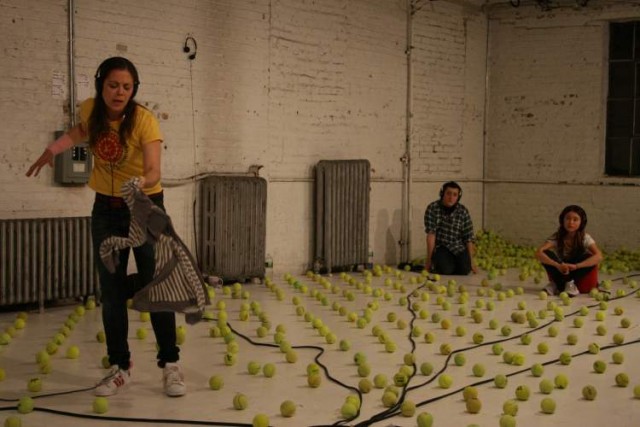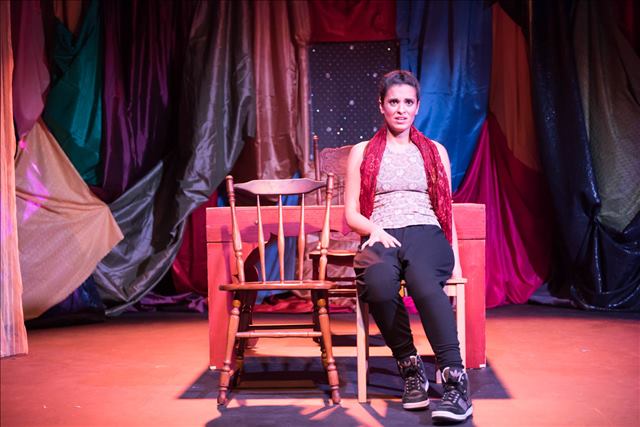
Nadia P. Manzoor plays twenty-one characters in deeply personal one-woman show (photo courtesy of Dan Demello Public Relations)
Teatro Circulo
64 East Fourth St. between Bowery & Second Ave.
January 14-18, 425-$30
www.nadiapmanzoor.com
www.teatrocirculo.org
Writer and performer Nadia P. Manzoor, who was born in Chicago, moved to Singapore and Dubai as a toddler, then was raised primarily in a Pakistani immigrant community in North London, lifts the veil off her struggle to break free of the cultural norms that envelop her in her one-woman show, Burq Off!, running through January 18 at Teatro Circulo. Mitchell Ost’s set features a table and three chairs surrounded by a crescent-shaped wall draped with heavy, brightly colored, elaborately designed fabrics, the only opening a small, sparkling window in the center back, offering Nadia the hint of a bigger world outside. Over the course of eighty minutes, Manzoor symbolically removes the layers of cloth that metaphorically obstruct Islamic women from living lives of freedom, using stories from her childhood as a microcosm for women around the world. Manzoor plays twenty-one people in the production, changing accents and twisting and folding a red scarf to create costumes to depict such characters as her mother, Ammi, and her father, Abbu, who both adhere to the old Pakistani ways; her annoying twin brother, Khurram; family friend Aunty Ji; Katy, her sexually liberated English schoolmate; her teacher Molvisaab; her first cousin and first crush, Mustafa; and her bartender boyfriend, Brendan. The modern-day Nadia, who serves as narrator, introduces the play with a memory of herself at five years old, when she wanted to be an astronaut. “Lying in bed, time would disappear as I gazed into the night sky. Mesmerized by the infinite, I would just begin to float, like smoke, far away from my bedroom, from my family, from my house in Hertfordshire, England, and towards I didn’t know what.” But her parents immediately shoot down her dreams. “How can you be an astronaut,” her father says. “Women can’t be astronauts. Who will cook? Who will clean? Who will feed your husband if you are floating about in space?” Her mother adds, “One day you will make a man very very happy.”
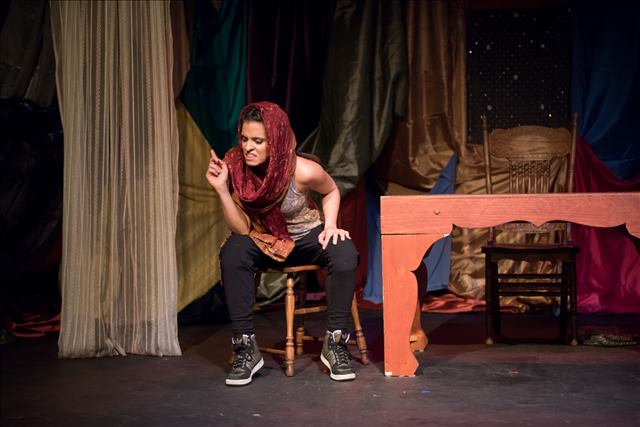
Nadia P. Manzoor uses various accents and a red scarf to differentiate among friends and family in BURQ OFF! (photo courtesy of Dan Demello Public Relations)
The setting shifts from her family’s dining room to her school dorm to her mother’s hospital bed as Nadia attempts to overcome the ties that bind her, experiencing love and loss as she considers options that go against the dictates of the society in which she was born and raised, including a set of strict, old-fashioned rules her father gives her as a college present. She talks about the influence of Bollywood movies, how her mother referred to her vagina as “shame shame,” and the hypocrisy of her culture. Manzoor has an easy way about her, immediately drawing the audience onto her side. Although some of the vignettes are fairly familiar for the coming-of-age genre, the bits about Mustafa and Brendan are particularly effective and unique. Directed and developed by Tara Elliott, Burq Off! recalls Marjane Satrapi’s graphic novel Persepolis, about a young girl growing up during the Islamic Revolution in Iran, and Anna Khaja’s one-woman show, Shadeed: The Dream and Death of Benazir Bhutto, in which Khaja portrays eight characters with differing views of the prime minister on the day she was killed. Manzoor, who is also preparing the online series Shugs & Fats, never gets quite so overtly political, but her personal liberation is political in and of itself, as it is for so many women in so many cultures around the world.
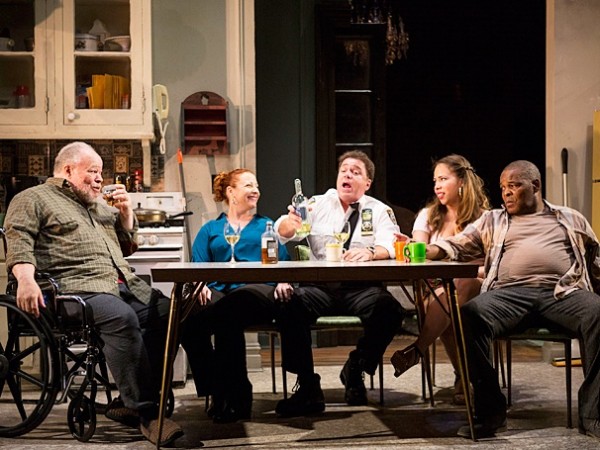
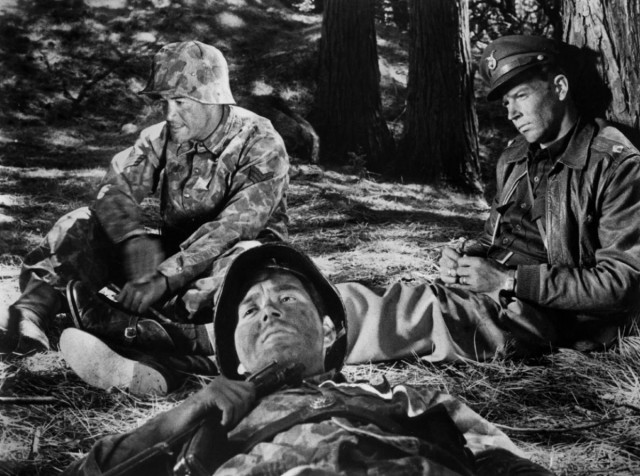
 Fear and Desire, Stanley Kubrick’s seldom-seen 1953 psychological war drama and his first full-length film, made when he was just twenty-four, is a curious tale about four soldiers (Steve Coit, Kenneth Harp, Paul Mazursky, and Frank Silvera) trapped six miles behind enemy lines. When they are spotted by a local woman (Virginia Leith), they decide to capture her and tie her up, but leaving Sidney (Mazursky) behind to keep an eye on her turns out to be a bad idea. Meanwhile, they discover a nearby house that has been occupied by the enemy, and they argue over whether to attack or retreat. Written by Howard Sackler, who was a high school classmate of Kubrick’s in the Bronx and would later win the Pulitzer Prize for The Great White Hope, and directed, edited, and photographed by the man who would go on to make such powerful, influential war epics as Paths of Glory, Full Metal Jacket, and Dr. Strangelove or: How I Learned to Stop Worrying and Love the Bomb, Fear and Desire features stilted dialogue, much of which is spoken off-camera and feels like it was dubbed in later. Many of the cuts are jumpy and much of the framing amateurish. Kubrick was ultimately disappointed with the film and wanted it pulled from circulation; instead it was preserved by Eastman House in 1989 and restored twenty years later, which was good news for film lovers, as it is fascinating to watch Kubrick learning as the film continues. His exploration of the psyche of the American soldier is the heart and soul of this compelling black-and-white war drama that is worth seeing for more than just historical reasons.
Fear and Desire, Stanley Kubrick’s seldom-seen 1953 psychological war drama and his first full-length film, made when he was just twenty-four, is a curious tale about four soldiers (Steve Coit, Kenneth Harp, Paul Mazursky, and Frank Silvera) trapped six miles behind enemy lines. When they are spotted by a local woman (Virginia Leith), they decide to capture her and tie her up, but leaving Sidney (Mazursky) behind to keep an eye on her turns out to be a bad idea. Meanwhile, they discover a nearby house that has been occupied by the enemy, and they argue over whether to attack or retreat. Written by Howard Sackler, who was a high school classmate of Kubrick’s in the Bronx and would later win the Pulitzer Prize for The Great White Hope, and directed, edited, and photographed by the man who would go on to make such powerful, influential war epics as Paths of Glory, Full Metal Jacket, and Dr. Strangelove or: How I Learned to Stop Worrying and Love the Bomb, Fear and Desire features stilted dialogue, much of which is spoken off-camera and feels like it was dubbed in later. Many of the cuts are jumpy and much of the framing amateurish. Kubrick was ultimately disappointed with the film and wanted it pulled from circulation; instead it was preserved by Eastman House in 1989 and restored twenty years later, which was good news for film lovers, as it is fascinating to watch Kubrick learning as the film continues. His exploration of the psyche of the American soldier is the heart and soul of this compelling black-and-white war drama that is worth seeing for more than just historical reasons.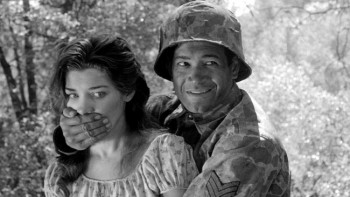

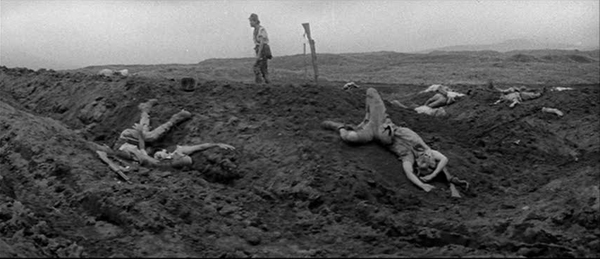
 Kon Ichikawa’s Fires on the Plain is one of the most searing, devastating war movies ever made. Loosely based on Shohei Ooka’s 1952 novel and adapted by Ichikawa’s wife, screenwriter Natto Wada, the controversial film stars Eiji Funakoshi as the sad sack Tamura, a somewhat pathetic tubercular soldier on the island of Leyte in the Philippines at the tail end of World War II. After being released from a military hospital, he returns to his platoon, only to be ordered to go back to the hospital so as not to infect the other men. He is also given a grenade and ordered to blow himself up if the hospital refuses him, which it does. But instead of killing himself, Tamura wanders the vast, empty spaces and dense forests, becoming involved in a series of vignettes that range from darkly comic to utterly horrifying. He encounters a romantic Filipino couple hiding salt under their floorboards, a quartet of soldiers stuffed with yams trying to make it alive to a supposed evacuation zone, and a strange duo selling tobacco and eating “monkey” meat. As Tamura grows weaker and weaker, he considers surrendering to U.S. troops, but even that is not a guarantee of safety, as the farther he travels, the more dead bodies he sees. Fires on the Plain is a blistering attack on the nature of war and what it does to men, but amid all the bleakness and violence, tiny bits of humanity try desperately to seep through against all the odds. And the odds are not very good. Fires on the Plain is screening January 19 at 1:00 at the Walter Reade Theater as part of the War Against War sidebar program of the twenty-fourth annual New York Jewish Film Festival, which focuses on antiwar films from the 1950s and 1960s; the schedule also includes Gillo Pontecorvo’s Battle of Algiers, Stanley Kubrick’s Fear and Desire, Konrad Wolf’s I Was Nineteen, Jean-Luc Godard’s Les Carabiniers, and Peter Watkin’s The War Game, anchored by a panel discussion on January 19 at 3:00 at the Elinor Bunin Munroe Film Center (free with
Kon Ichikawa’s Fires on the Plain is one of the most searing, devastating war movies ever made. Loosely based on Shohei Ooka’s 1952 novel and adapted by Ichikawa’s wife, screenwriter Natto Wada, the controversial film stars Eiji Funakoshi as the sad sack Tamura, a somewhat pathetic tubercular soldier on the island of Leyte in the Philippines at the tail end of World War II. After being released from a military hospital, he returns to his platoon, only to be ordered to go back to the hospital so as not to infect the other men. He is also given a grenade and ordered to blow himself up if the hospital refuses him, which it does. But instead of killing himself, Tamura wanders the vast, empty spaces and dense forests, becoming involved in a series of vignettes that range from darkly comic to utterly horrifying. He encounters a romantic Filipino couple hiding salt under their floorboards, a quartet of soldiers stuffed with yams trying to make it alive to a supposed evacuation zone, and a strange duo selling tobacco and eating “monkey” meat. As Tamura grows weaker and weaker, he considers surrendering to U.S. troops, but even that is not a guarantee of safety, as the farther he travels, the more dead bodies he sees. Fires on the Plain is a blistering attack on the nature of war and what it does to men, but amid all the bleakness and violence, tiny bits of humanity try desperately to seep through against all the odds. And the odds are not very good. Fires on the Plain is screening January 19 at 1:00 at the Walter Reade Theater as part of the War Against War sidebar program of the twenty-fourth annual New York Jewish Film Festival, which focuses on antiwar films from the 1950s and 1960s; the schedule also includes Gillo Pontecorvo’s Battle of Algiers, Stanley Kubrick’s Fear and Desire, Konrad Wolf’s I Was Nineteen, Jean-Luc Godard’s Les Carabiniers, and Peter Watkin’s The War Game, anchored by a panel discussion on January 19 at 3:00 at the Elinor Bunin Munroe Film Center (free with 